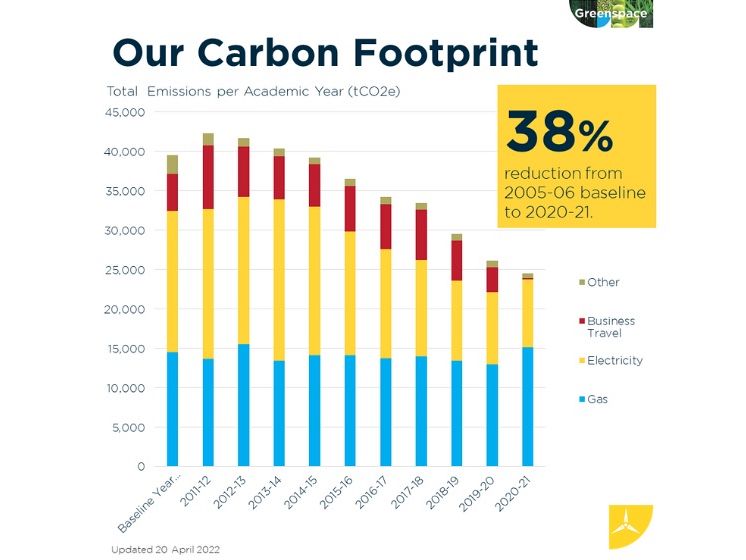You may have noticed that the My Greenspace website has changed since we first launched. The new homepage makes it easier for you to track your impact, with a new action counter, and a caculation of total CO2 saved by your actions.
We also have the Impact Dashboard where you can see how our actions are making an impact. By switching off we have saved 58,737 kWh of electricity and our shorter showers have saved 102,02 litres of water.
There are plenty of prizes up for grabs for individuals and teams taking part in My Greenspace, and each term a winning team is awarded £200 to donate to their chosen charity, with our last winning team in the International Office donating to the autism charity Little Treasures.
Read on for more fantastic steps taken toward a greener future here at Durham.

My Greenspace: find recipes, crafts and photos submitted by our community
Green Move Out 2022
This year’s Green Move Out has begun! From Monday, 6 June, purple bags will be delivered to colleges and livers-out across Durham to allow students to donate their unwanted items to charity during the move out period. The Green Move Out was established in 2005 and to date 40,000 bags have been donated to our charity partners.
You can get involved this year by filling your purple bag with unwanted items and putting it out for collection - you can find more details on the website.
Alternatively, staff members can support the scheme by volunteering their time to help with bag sorting, as part of the staff volunteering scheme.
Hedgehog Awareness Week
Between 1 and 7 May, Durham University celebrated the British Hedgehog Preservation Society’s Hedgehog Awareness Week.
Taking place every year, the event aims to highlight the problems hedgehogs face and how you can help them. This year, Durham University Hedgehog Friendly Campus and others organised a range of events to mark the occasion, including litter picks, opening a new hedgehog house in the Botanic Garden, a bake off with hedgehog-shaped cakes and baked goods, and a hedgehog quiz.

Walking Month of May
In May we partnered with Living Streets to run an exciting campaign, encouraging employees to take small walking challenges throughout the month.
Many pledges were made, which included walking 30 minutes each lunchtime, and each pledge put staff in with a chance of winning a prize. There are lots of short walks or self-guided walks around our grounds, including at the Botanic Garden, Houghall Woods and these short walks from Lower Mountjoy created by Living Streets.
Staff could also take part in training to become a ’walking champion’, raising awareness about activities and enabling colleagues to make informed decisions about their health.
Scope 3 carbon footprint
Colleagues from across the University worked with the Carbon Trust to calculate our Scope 3 carbon footprint, which has produced our most comprehensive footprint to date. This exercise will help to inform our forthcoming net-zero strategy.
The Scope 3 emissions sources included in this footprint can be seen in the chart below. The top four emitting categories are:
- Purchased goods and services (30%)
- Capital goods (28%)
- Commuting (23%)
- Business Travel (8%)

Taking a deep dive into recycling
Did you know that Durham University's food waste is used to heat homes?
We work with Biffa and GAP Group NE to send food waste from our catered colleges and campus food outlets to an anaerobic digestion plant in Felling, Gateshead, where it is broken down to create biomethane which goes into the National Grid.
The University also has a process in place for recycling its Waste Electrical and Electronic Equipment (WEEE).
WEEE is the fastest growing waste industry in the UK, and back in March we visited GAP facilities to take a look at what happens to our waste once it leaves campus. Find out more about Waste and Recycling here.
Bike Week
Your health, your climate, your pocket, and your community are all better by bike – that's why we we’re encouraging as many staff as possible to take part in Bike Week from 6-12 June 2022:
- Cycling to work can mean you have a 45% lower risk of developing cancer, and a 46% lower risk of cardiovascular disease
- A switch of one journey per day reduces a person’s carbon footprint by approximately 0.5 tonnes over a year
- If all cycle journeys increased from the current level of 2% to 25% by 2050, the collective benefit would be £248bn
Stay in touch for more next month, when we’ll be sharing pictures from our largest Greenspace Festival yet!
For more regular updates follow us on Facebook and Instagram @DUGreenspace
